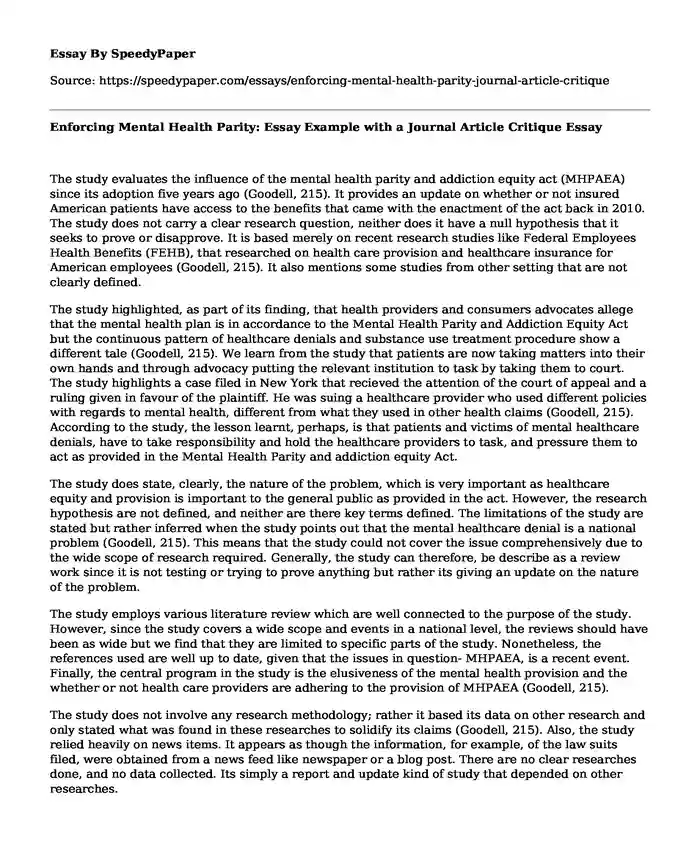
| Type of paper: | Essay |
| Categories: | Health and Social Care Mental health |
| Pages: | 3 |
| Wordcount: | 688 words |
The study evaluates the influence of the mental health parity and addiction equity act (MHPAEA) since its adoption five years ago (Goodell, 215). It provides an update on whether or not insured American patients have access to the benefits that came with the enactment of the act back in 2010. The study does not carry a clear research question, neither does it have a null hypothesis that it seeks to prove or disapprove. It is based merely on recent research studies like Federal Employees Health Benefits (FEHB), that researched on health care provision and healthcare insurance for American employees (Goodell, 215). It also mentions some studies from other setting that are not clearly defined.
The study highlighted, as part of its finding, that health providers and consumers advocates allege that the mental health plan is in accordance to the Mental Health Parity and Addiction Equity Act but the continuous pattern of healthcare denials and substance use treatment procedure show a different tale (Goodell, 215). We learn from the study that patients are now taking matters into their own hands and through advocacy putting the relevant institution to task by taking them to court. The study highlights a case filed in New York that recieved the attention of the court of appeal and a ruling given in favour of the plaintiff. He was suing a healthcare provider who used different policies with regards to mental health, different from what they used in other health claims (Goodell, 215). According to the study, the lesson learnt, perhaps, is that patients and victims of mental healthcare denials, have to take responsibility and hold the healthcare providers to task, and pressure them to act as provided in the Mental Health Parity and addiction equity Act.
The study does state, clearly, the nature of the problem, which is very important as healthcare equity and provision is important to the general public as provided in the act. However, the research hypothesis are not defined, and neither are there key terms defined. The limitations of the study are stated but rather inferred when the study points out that the mental healthcare denial is a national problem (Goodell, 215). This means that the study could not cover the issue comprehensively due to the wide scope of research required. Generally, the study can therefore, be describe as a review work since it is not testing or trying to prove anything but rather its giving an update on the nature of the problem.
The study employs various literature review which are well connected to the purpose of the study. However, since the study covers a wide scope and events in a national level, the reviews should have been as wide but we find that they are limited to specific parts of the study. Nonetheless, the references used are well up to date, given that the issues in question- MHPAEA, is a recent event. Finally, the central program in the study is the elusiveness of the mental health provision and the whether or not health care providers are adhering to the provision of MHPAEA (Goodell, 215).
The study does not involve any research methodology; rather it based its data on other research and only stated what was found in these researches to solidify its claims (Goodell, 215). Also, the study relied heavily on news items. It appears as though the information, for example, of the law suits filed, were obtained from a news feed like newspaper or a blog post. There are no clear researches done, and no data collected. Its simply a report and update kind of study that depended on other researches.
The conclusion of the study is the same as its recommendation. According to the study, the MHPAEA has not been followed by most healthcare providers across the country (Goodell, 215). Thus, the study recommends or appears to recommend that the only way for patients to recieved justice provided in the law, is putting pressure on both the government and the private sector engaged with healthcare provision; to deliver on their mandate. Basically, it recommends filing laws suits against anyone going against MHPAEA.
Reference
Sarah Goodell. (215). Enforcing Mental Health Parity. Five years. health policy brief, 7.
Cite this page
Enforcing Mental Health Parity: Essay Example with a Journal Article Critique. (2019, Jun 24). Retrieved from https://speedypaper.net/essays/enforcing-mental-health-parity-journal-article-critique
Request Removal
If you are the original author of this essay and no longer wish to have it published on the SpeedyPaper website, please click below to request its removal:
- Essay Sample on Police Brutality and Racism
- Essay Sample on I Heard A Fly Buzz by Emily Dickinson
- Pornography Research Paper Example
- Essay Sample on Company Registration in the UK and Germany
- Essay Sample Dedicated to the Impact of Climate Change on the Ozone Hole
- Essay Example: Nurse's Cultural Background and Impact on Care
- Free Essay Example on Analysis of Newspapers
Popular categories




